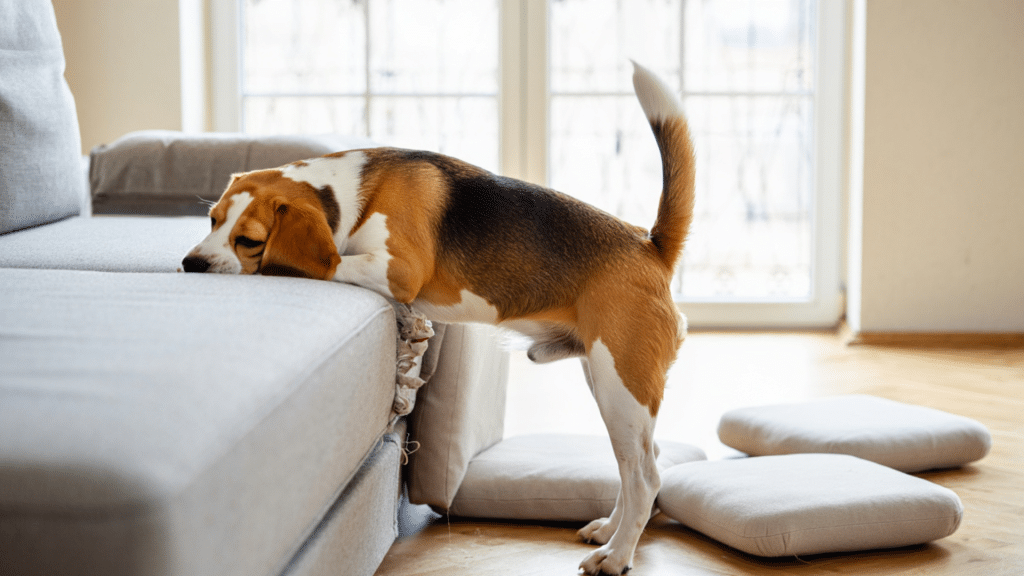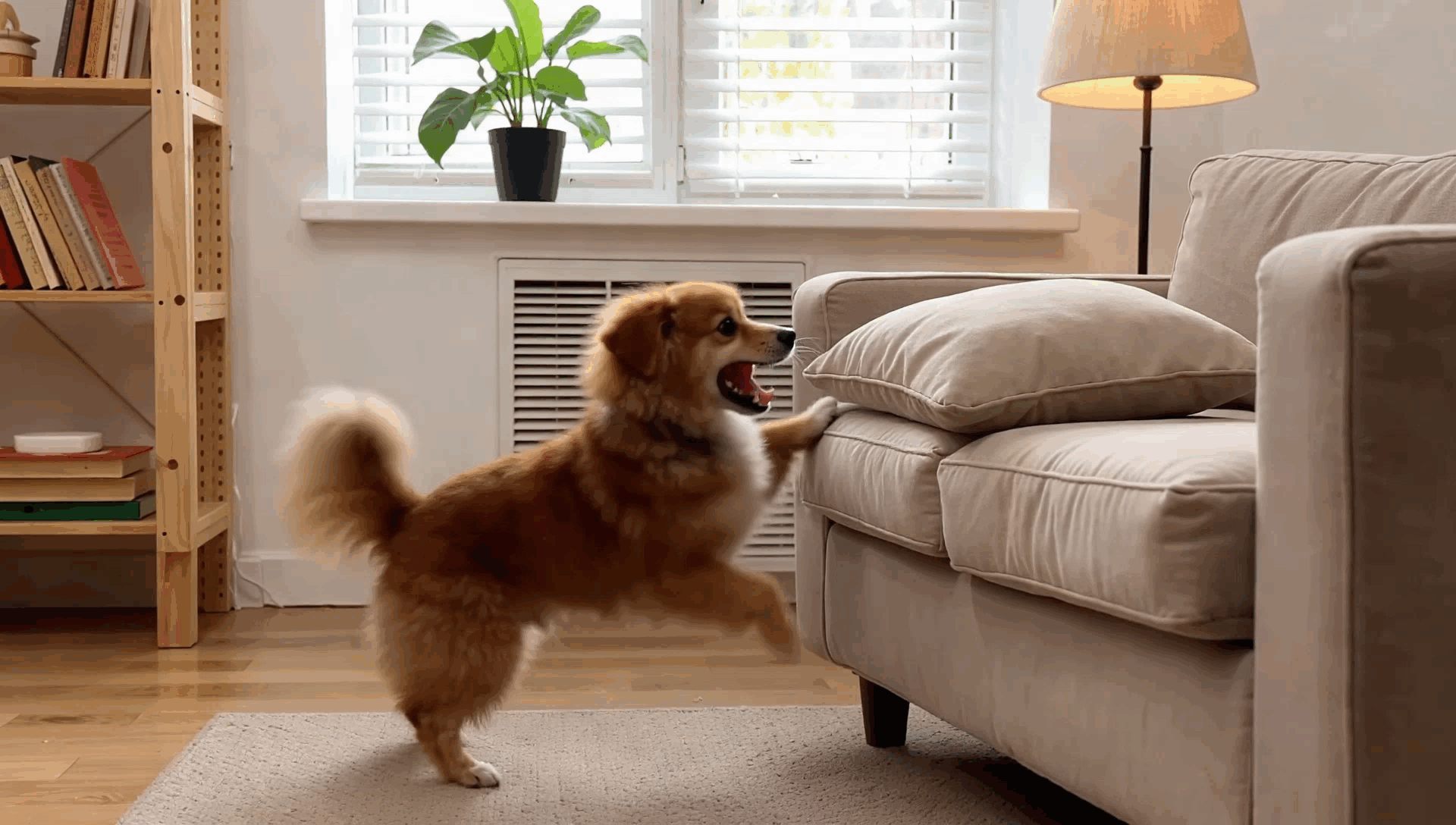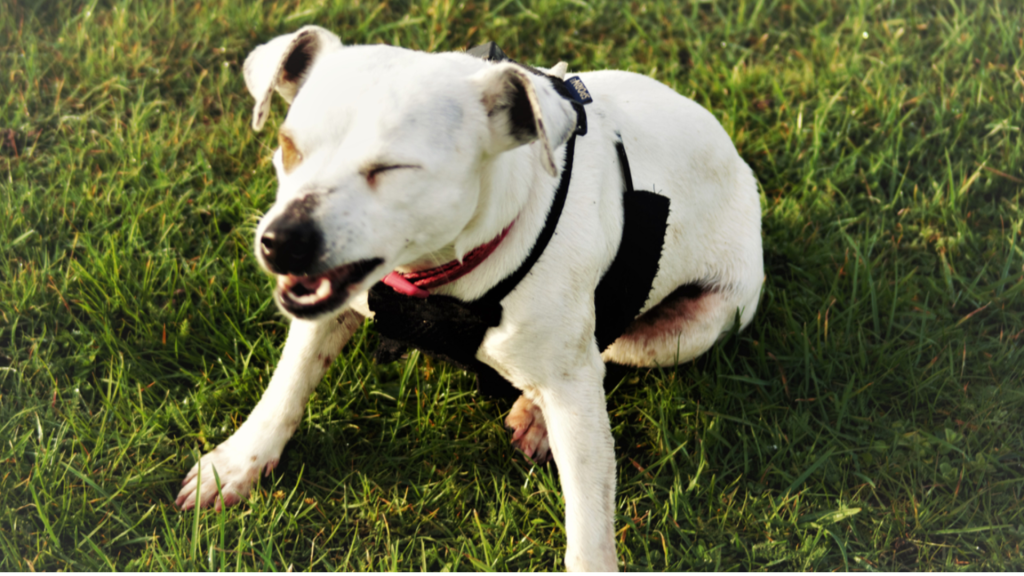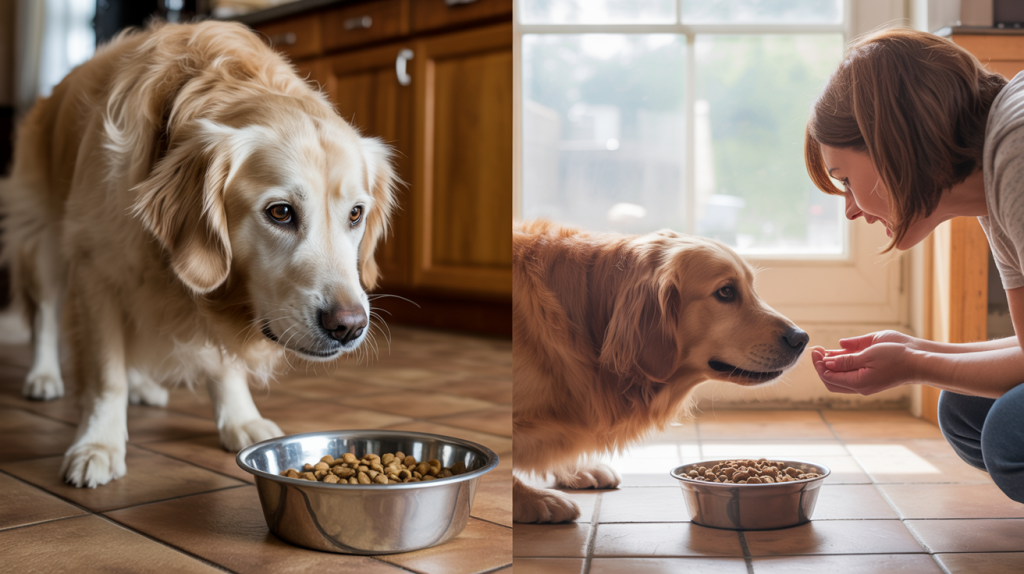Ever catch your dog frantically pawing and digging at your bed or couch before they settle down? You’re watching one of the most fascinating canine behaviors in action.
Most pet parents wonder why do dogs dig on beds and couches, and whether this weird ritual means something’s wrong.
Some folks worry their dog is being destructive, while others just find it annoying when their pup spends five minutes “making the bed” before lying down. This behavior is way more meaningful than you might think.
Today, we’re looking into the real reasons behind this digging behavior.
You’ll learn what your dog is trying to accomplish and when it’s normal versus when you might need to step in.
The Mystery of Digging Behavior
Dogs don’t just dig for fun there’s a whole mix of instincts, needs, and emotions driving that behavior.
Sometimes it’s nature calling back to their wild ancestors, other times it’s about finding comfort, burning energy, or chasing something their nose picked up. This is also why many owners wonder, “Why does my dog dig in his bed?” it’s often the same instinctive behavior, just brought indoors.
Certain breeds even have digging hardwired into their DNA. While to us it might look like random mischief, to them it’s a purposeful activity that feels rewarding and satisfying.
Understanding these reasons can help you see the world through your dog’s paws and maybe even make peace with a few extra holes in the yard.
Why Do Dogs Dig on Beds and Couches
Dogs have many reasons for this quirky habit, and the answer to why do dogs dig on beds and couches, as well as why do dogs dig in the bed, is explained below so you can better understand and manage your pup’s behavior.
1. Temperature Regulation and Comfort
Dogs dig holes to stay comfortable in different weather. In hot summer days, they create cool spots in the dirt to lie down and escape the heat.
During cold weather, digging helps them make warm, sheltered areas that protect them from wind and cold temperatures, just like their wild ancestors did for survival.
2. Natural Denning Instinct
This behavior comes from thousands of years of evolution. Wild dogs and wolves dig dens to create safe spaces for sleeping, hiding, and raising puppies.
Even though your house dog has a cozy bed, this instinct is still strong and makes them want to create their own special underground hideaway.
3. Hunting and Prey Drive
Many dogs dig because they smell or hear small animals like moles, mice, or insects underground.
Their powerful noses can detect these creatures, and their hunting instincts kick in. They’re essentially trying to catch prey, even if they never actually find anything the excitement of the hunt is enough to keep them digging.
4. Boredom and Excess Energy
Dogs with too much energy and not enough mental stimulation often turn to digging as entertainment.
It’s like their version of a hobby, it keeps their minds busy and burns off extra energy. This is especially common in high-energy breeds that don’t get enough exercise or playtime during the day.
5. Anxiety and Stress Relief
Some dogs dig when they’re feeling worried, stressed, or anxious. The repetitive action of digging can be soothing and help them cope with uncomfortable emotions.
Dogs with separation anxiety might dig near doors or windows trying to escape, or just to release nervous energy when their owners are away.
6. Attention-Seeking Behavior
Smart dogs quickly learn that digging gets a big reaction from their humans. Even if that reaction is scolding, it’s still attention, and some dogs prefer negative attention over being ignored.
If your dog only digs when you’re watching, they’re probably doing it to get you to interact with them.
7. Scent Investigation
Dogs have incredibly powerful noses about 40 times stronger than ours. When they smell something interesting buried in the ground, they can’t resist investigating.
This might be food scraps, animal scents, or just interesting smells from things that were buried there long ago.
8. Hiding Valuable Items
This instinct comes from their wild heritage when food was scarce. Dogs often dig holes to bury and hide their favorite toys, bones, or treats for later.
They’re essentially creating their own personal treasure vault, even though they might never actually come back to retrieve these items.
Normal vs. Problematic Digging in Dogs
Understanding why do dogs dig on beds and couches, is it harmless or a sign of a deeper issue is key to addressing it effectively. Below is a table comparing normal digging habits with problematic behavior:
| Aspect | Normal Digging | Problematic Digging |
|---|---|---|
| Frequency | Occurs occasionally, often linked to play or curiosity. | Happens frequently or for long periods without pause. |
| Triggers | Specific scents, playtime, or temperature changes. | No clear trigger; happens regardless of environment or activity. |
| Impact | Minimal damage to yard or home; easily managed. | Significant destruction to property, garden, or furniture. |
| Behavior Context | Dog appears relaxed and happy while digging. | Dog seems anxious, restless, or distressed before, during, or after digging. |
| Underlying Causes | Instinctive behavior, harmless fun, or occasional comfort-seeking. | Possible anxiety, boredom, lack of exercise, or medical issues needing attention. |
Practical Solutions for Pet Owners
If your dog’s digging habit is driving you crazy, don’t worry there are plenty of effective ways to redirect this behavior. Below are some proven solutions that can help you manage your pup’s digging while keeping both of you happy.
- Create a designated digging area: Set up a sandbox or specific yard spot where digging is allowed, and make it exciting by burying treats or toys there.
- Increase exercise and mental stimulation: Longer walks, puzzle toys, and training sessions help burn off extra energy and reduce digging urges.
- Use positive redirection: When you catch your dog digging, call them over, reward them, and offer an acceptable alternative activity.
- Address anxiety or boredom: Provide comfort items, interactive play, and training; seek a trainer’s help if needed.
- Protect off-limits areas: Use barriers like chicken wire, rocks, or decorative fencing to block access to gardens or flower beds.
- Supervise and deter: Watch your dog outside and use natural deterrents like citrus peels or coffee grounds in problem areas.
Understanding Your Dog’s Needs
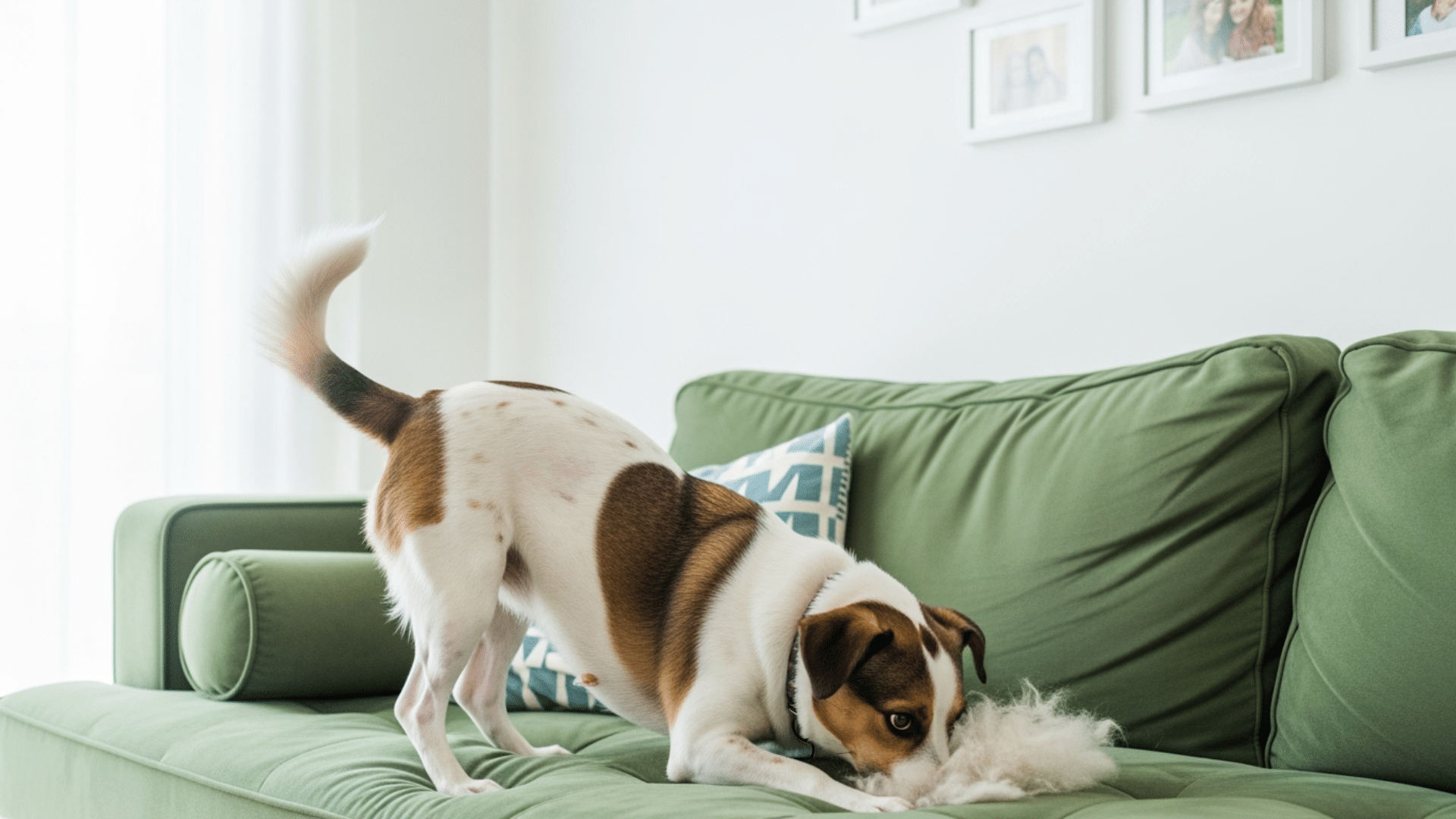
The key to stopping problem digging is figuring out what your dog actually needs.
Most digging happens because dogs are missing something important, like enough exercise, mental challenges, or just plain attention from you. Think about your pup’s daily routine and see what’s lacking.
Some breeds are natural diggers, too. Terriers like Jack Russells and Fox Terriers were bred to hunt underground, while Dachshunds were made to chase badgers in burrows.
Huskies and Beagles also dig more than other breeds due to their hunting instincts.
Pay attention to when your dog digs most. Once you understand the “why,” you can fix the real problem instead of just treating the symptoms.
When to Consult a Professional Trainer
If your dog’s digging has become excessive, destructive, or linked to possible health risks, it may be time to get expert help.
The signs below outline when you should consult a veterinarian or professional trainer. These cover both problematic digging behaviors and urgent health concerns.
1. Heat-related distress: Excessive digging in hot weather with panting, drooling, weakness.
2. Frequent, uncontrollable digging: Multiple daily episodes or long, digging sessions.
3. No clear trigger: Digging without an obvious cause, such as play or scent.
4. Destructive behavior: Large holes or damage to gardens, lawns, or property.
5. Signs of anxiety or stress: Pacing, whining, or escape attempts linked to digging.
6. Possible medical cause: Digging accompanied by lethargy, weight loss, or other health changes.
Conclusion
That annoying digging ritual your dog does isn’t so mysterious anymore; it’s actually a window into their fascinating inner world.
We’ve found out why do dogs dig on beds and couches, breaking down eight key reasons behind this behavior. You’ve seen how to distinguish normal habits from problematic patterns, practical solutions, and learned when it’s time to seek professional help.
The next time your pup starts their pre-nap digging routine, you’ll understand they’re not being destructive, they’re just following thousands of years of hardwired instincts to create the perfect sleeping spot.
Does your dog have any unique digging quirks we didn’t cover? Share your stories below!


